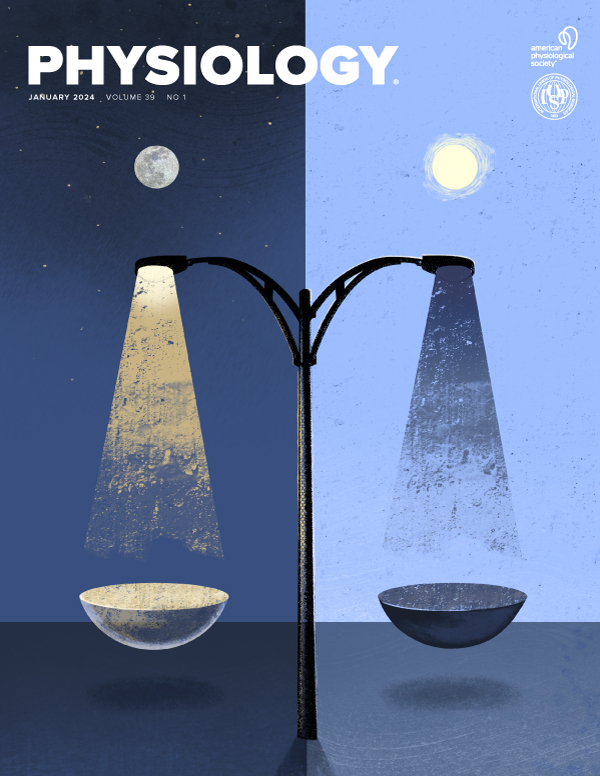Erbb3 regulation of secretory differentiation in the intestinal epithelium
IF 5.3
2区 医学
Q1 PHYSIOLOGY
引用次数: 0
Abstract
Background: Previous work by our lab showed that intestinal-specific deletion of the ErbB3 receptor tyrosine kinase results in increased ileal Paneth cell numbers. These cells produce host defense peptides and support stem cells with growth factors. The mechanisms by which ErbB3 regulates Paneth cells are not well understood, but a candidate mediator is the polycomb repressor complex 1 component BMI1, which marks secretory progenitor cells. Furthermore, while there are no Paneth cells in the mouse colon, deep crypt secretory (DCS) cells are a distinct Reg4+ population that have some functional overlap with both Paneth and goblet cells; we will also test whether ErbB3 regulates DCS differentiation. Overall we are testing the hypothesis that ErbB3 regulates secretory cell numbers through BMI1. Methods: We bred Villin-Cre;ErbB3flox/flox mice (ErbB3ΔIE) to delete ErbB3 from the intestinal epithelium. Colonic sections from ErbB3ΔIE and ErbB3flox/flox littermates were subjected to RNAscope in situ hybridization for Reg4. RNA from mucosal scrapings (both ileum and colon) was assessed by qPCR for Reg4, Bmi1, and Lgr5. To test signaling mechanisms, we treated HT-29 cells with NRG-1β to activate ErbB3, +/- inhibitors to PI3K (LY294002), MEK/MAPK (U0126), or BMI1 (PTC-209). Colonoids and enteroids from ErbB3ΔIE and ErbB3flox/flox mice were used to confirm responses in a non-transformed system. Results: In ErbB3ΔIE mice, the colonic epithelium showed increased Reg4 levels and more Reg4+ cells compared to littermate controls, similar to our published data for the Paneth cell marker Lyz1 in ileum. BMI1 RNA and protein levels were also increased in both small and large intestinal mucosal scrapings from ErbB3ΔIE mice vs. littermates. ErbB3ΔIE colonoids had increased Reg4 versus control colonoids, and NRG-1β reduced levels in control but not ErbB3ΔIE cultures. Ileal enteroids showed a decrease in Lyz1 expression with Bmi1 inhibition and an increase in Bmi1 expression with PI3K and MAPK blockade. In HT-29 cells, NRG-1β treatment reduced Reg4 and Bmi1 expression. Conversely, Reg4 and Bmi1 were induced by PI3K inhibition with LY294002 (p<0.03) (p<0.0005) or MEK/MAPK inhibition with U0126 (p<0.05) (p<0.0001). Conclusions: NRG1-ErbB3 signaling restricts both ileal Paneth ( Lyz1+) and colonic DCS ( Reg4+) cell numbers. Furthermore, ErbB3 regulates Bmi1 expression through PI3K/Akt and MAPK signaling and BMI1 activity promotes secretory cell development. Since loss of DCS or Paneth cells has been shown to disrupt the intestinal stem cell niche and secretory cell markers are altered in several intestinal disease states, these results may point to potential future therapeutic avenues targeting this regulatory mechanism. NIH/NIDDK award R01DK095004. This is the full abstract presented at the American Physiology Summit 2024 meeting and is only available in HTML format. There are no additional versions or additional content available for this abstract. Physiology was not involved in the peer review process.Erbb3 对肠上皮分泌分化的调控
背景:我们实验室之前的研究表明,肠道特异性缺失 ErbB3 受体酪氨酸激酶会导致回肠 Paneth 细胞数量增加。这些细胞产生宿主防御肽,并通过生长因子支持干细胞。ErbB3调节Paneth细胞的机制尚不十分清楚,但多聚核抑制因子复合体1(polycomb repressor complex 1)成分BMI1是一个候选介导因子,它标志着分泌祖细胞。此外,虽然小鼠结肠中没有 Paneth 细胞,但深隐窝分泌(DCS)细胞是一个独特的 Reg4+ 群体,与 Paneth 细胞和鹅口疮细胞在功能上有一些重叠;我们还将检验 ErbB3 是否调控 DCS 的分化。总之,我们正在检验 ErbB3 通过 BMI1 调节分泌细胞数量的假设。方法:我们培育了Villin-Cre;ErbB3flox/flox小鼠(ErbB3ΔIE),以从肠上皮细胞中删除ErbB3。对 ErbB3ΔIE 和 ErbB3flox/flox 小鼠的结肠切片进行 RNAscope 原位杂交检测 Reg4。粘膜刮片(回肠和结肠)的 RNA 通过 qPCR 对 Reg4、Bmi1 和 Lgr5 进行评估。为了测试信号转导机制,我们用 NRG-1β 处理 HT-29 细胞以激活 ErbB3,同时使用 PI3K(LY294002)、MEK/MAPK(U0126)或 BMI1(PTC-209)抑制剂。用 ErbB3ΔIE 和 ErbB3flox/flox 小鼠的结肠液和肠液确认非转化系统中的反应。结果与同窝对照组相比,ErbB3ΔIE 小鼠结肠上皮细胞的 Reg4 水平升高,Reg4+ 细胞增多,这与我们已发表的回肠中 Paneth 细胞标记物 Lyz1 的数据相似。与同种小鼠相比,ErbB3ΔIE 小鼠小肠和大肠粘膜刮片中的 BMI1 RNA 和蛋白质水平也都有所增加。与对照组结肠相比,ErbB3ΔIE 结肠组织中的 Reg4 含量增加,对照组结肠组织中的 NRG-1β 含量降低,而 ErbB3ΔIE 培养物中的 NRG-1β 含量则没有降低。在抑制 Bmi1 的情况下,回肠肠液中 Lyz1 的表达减少,而在阻断 PI3K 和 MAPK 的情况下,Bmi1 的表达增加。在 HT-29 细胞中,NRG-1β 处理会降低 Reg4 和 Bmi1 的表达。相反,用 LY294002 抑制 PI3K (p<0.03) (p<0.0005) 或用 U0126 抑制 MEK/MAPK (p<0.05) (p<0.0001) 会诱导 Reg4 和 Bmi1。结论NRG1-ErbB3信号传导限制了回肠Paneth(Lyz1+)和结肠DCS(Reg4+)细胞的数量。此外,ErbB3 通过 PI3K/Akt 和 MAPK 信号调节 Bmi1 的表达,BMI1 的活性促进分泌细胞的发育。由于DCS或Paneth细胞的缺失已被证明会破坏肠道干细胞生态位,而且分泌细胞标记物在几种肠道疾病状态下会发生改变,这些结果可能为未来针对这一调控机制的潜在治疗途径指明了方向。美国国立卫生研究院/美国国立医学研究院(NIH/NIDDK)授予 R01DK095004。这是在 2024 年美国生理学峰会上发表的摘要全文,只有 HTML 格式。本摘要没有附加版本或附加内容。生理学》未参与同行评审过程。
本文章由计算机程序翻译,如有差异,请以英文原文为准。
求助全文
约1分钟内获得全文
求助全文
来源期刊

Physiology
医学-生理学
CiteScore
14.50
自引率
0.00%
发文量
37
期刊介绍:
Physiology journal features meticulously crafted review articles penned by esteemed leaders in their respective fields. These articles undergo rigorous peer review and showcase the forefront of cutting-edge advances across various domains of physiology. Our Editorial Board, comprised of distinguished leaders in the broad spectrum of physiology, convenes annually to deliberate and recommend pioneering topics for review articles, as well as select the most suitable scientists to author these articles. Join us in exploring the forefront of physiological research and innovation.
文献相关原料
| 公司名称 | 产品信息 | 采购帮参考价格 |
|---|
 求助内容:
求助内容: 应助结果提醒方式:
应助结果提醒方式:


